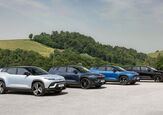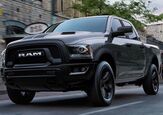Gas War: Justice Department Drops Antitrust Probe Against Automakers Siding With California

The United States Department of Justice has ended its investigation into Ford, Honda, Volkswagen, and BMW over a presumed antitrust violation stemming from a deal they made with California to adhere to regional emission rules. Their agreement technically circumvents the current administration’s plan to freeze national emissions and fuel economy standards — established while President Obama was still in office — at 2021 levels through 2026. Under the California deal, the automakers promised to comply with pollution and gas mileage requirements that are more stringent than the federal standards suggested in the rollback proposal.
But the probe also looked like retaliation from the Trump administration against automakers publicly siding with the state causing the most trouble in the gas war. Under the deal, the automakers promised to comply with pollution and economy requirements that are tougher than proposed federal standards. Despite the corporate promise being as empty as an Oscar speech, it was still an affront to the current administration’s efforts to tamp down lofty efficiency targets put in place just days before it came into power.
While the Justice Department hasn’t explicitly said why it closed the investigation, it’s presumed that it simply didn’t find anything that it felt violated antitrust laws. California Governor Gavin Newsom said on Friday that he wasn’t surprised by the decision, stating that the “trumped-up charges were always a sham, a blatant attempt by the Trump administration to prevent more automakers from joining California and agreeing to stronger emissions standards.”
Frankly, we don’t even think the two sides are having the same argument anymore.
California has focused on combating climate change and pushing new technologies while the Trump administration said it’s committed to maintaining jobs, lowering the cost of automobiles via deregulation, and providing consumers with choice. They’ve both been jerks about getting their own way, too. However, the validity of their respective arguments likely hinges upon your own personal perspective.
California offered tons of pushback against the whole rollback thing, going to great lengths to ensure its continued self-regulation while getting as many other states to adhere to its targets as possible. In September, the state’s authority to set auto mileage standards was revoked. The issue will likely be tied up in federal courts for years, as the Golden State isn’t going to go down without a struggle — and has been extremely litigious throughout.
Since the rollback proposal still has not been finalized, it’s not clear how drastic it will ultimately be. The Environmental Protection Agency previously suggested halting existing efficiency mandates in 2021 (with previous drafts issuing the freeze a year earlier), with nothing set in stone. The president said in December to expect the final draft within the next 12 months, noting that he anticipated continued legal problems from California.
Now that seems like a very safe assumption.
[Image: CC7/Shutterstock]

A staunch consumer advocate tracking industry trends and regulation. Before joining TTAC, Matt spent a decade working for marketing and research firms based in NYC. Clients included several of the world’s largest automakers, global tire brands, and aftermarket part suppliers. Dissatisfied with the corporate world and resentful of having to wear suits everyday, he pivoted to writing about cars. Since then, that man has become an ardent supporter of the right-to-repair movement, been interviewed on the auto industry by national radio broadcasts, driven more rental cars than anyone ever should, participated in amateur rallying events, and received the requisite minimum training as sanctioned by the SCCA. Handy with a wrench, Matt grew up surrounded by Detroit auto workers and managed to get a pizza delivery job before he was legally eligible. He later found himself driving box trucks through Manhattan, guaranteeing future sympathy for actual truckers. He continues to conduct research pertaining to the automotive sector as an independent contractor and has since moved back to his native Michigan, closer to where the cars are born. A contrarian, Matt claims to prefer understeer — stating that front and all-wheel drive vehicles cater best to his driving style.
More by Matt Posky
Latest Car Reviews
Read moreLatest Product Reviews
Read moreRecent Comments
- MaintenanceCosts What is the actual out-the-door price? Is it lower or higher than that of a G580?
- ToolGuy Supercharger > Turbocharger. (Who said this? Me, because it is the Truth.)I have been thinking of obtaining a newer truck to save on fuel expenses, so this one might be perfect.
- Zerofoo Calling Fisker a "small automaker" is a stretch. Fisker designed the car - Magna actually builds the thing.It would be more accurate to call Fisker a design house.
- ToolGuy Real estate, like cars: One of the keys (and fairly easy to do) is to know which purchase NOT to make. Let's see: 0.43 acre lot within shouting distance of $3-4 million homes. You paid $21.8M in 2021, but want me to pay $35M now? No, thank you. (The buyer who got it for $8.5M in 2020, different story, maybe possibly.) [Property taxes plus insurance equals $35K per month? I'm out right there lol.] Point being, you can do better for that money. (At least the schools are good? Nope lol.)If I bought a car company, I would want to buy Honda. Because other automakers have to get up and go to work to make things happen, but Honda can just nap away because they have the Power of Dreams working for them. They can just rest easy and coast to greatness. Shhhh don't wake them. Also don't alert their customers lol.
- Kwik_Shift_Pro4X Much nicer vehicles to choose from for those coins.


































Comments
Join the conversation
I'll nominate my 2016 Prius. Weird headlight design and whackadoodle rear styling. The 2019's revisions are big improvements.
test